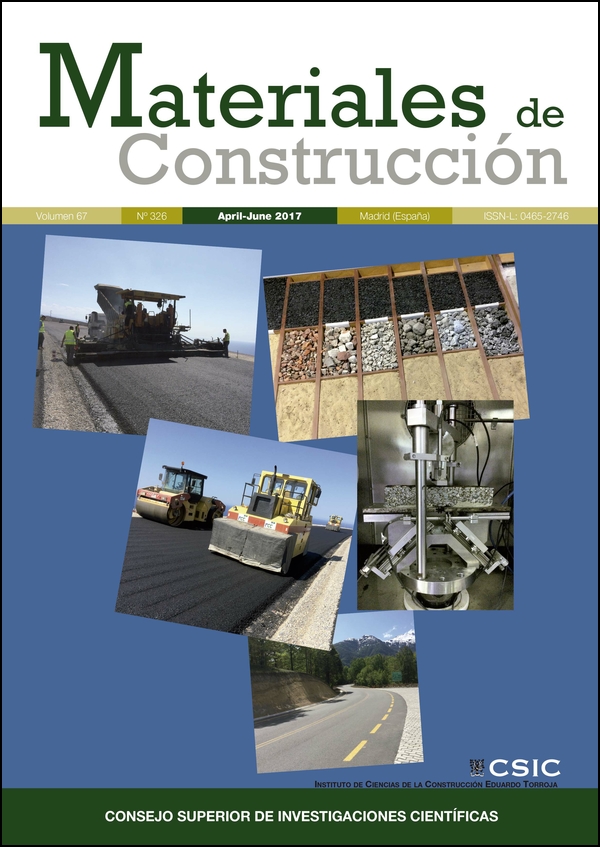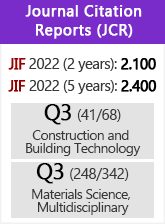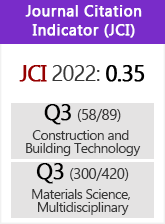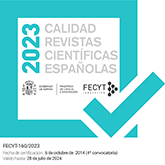Impact of the use of alternative fuels on clinker reactivity
DOI:
https://doi.org/10.3989/mc.2017.08215Keywords:
Portland cement, Clinker, Alternative fuels, Hydration, EmissionsAbstract
The use of alternative fuels in the cement industry has increased its relevance in the past decades due to their ecological and economic benefits. In concert with the efforts to increase its use, several studies have focused on their potential impact with respect to clinker reactivity and how they could affect the expected physical and mechanical properties. This work studied the effects of five alternative fuels on the reactivity of eight industrial clinker samples, considering several analytical techniques. Differences were identified among the clinker samples after replacing the alternative fuels, mainly with simultaneous eliminations, as in samples S4, S5 and S8. The modifications were related to the polymorph, size and reactivity of tricalcium silicate and to the clinker profile during the hydration process, due to the SO3 consumption rate. These changes were expressed in the higher compressive strengths in comparison with the original reference clinker.
Downloads
References
Edenhofer, O. IPCC. (2014) Climate Change 2014: Mitigation of Climate Change. Contribution of Working Group III to the Fifth Assessment Report of the Intergovernmental Panel on Climate Change. http://www.globalchange.umd.edu/iamc_data/iamc2014/Edenhofer_IAMC_17November.pdf
Cembureau. (1999) Environmental Benefits of Using Alternative Fuels in Cement Production: A Life-Cycle Approach. The European Cement Association.
G.H. Brundtland. (1987) Report of the World Commission on Environment and Development. United Nations General Assembly Oslo.
Trezza, M.; Scian, A. (2009) Estructura y Propiedades de Clinkers de Cemento Portland obtenidos con Combustibles Residuales. Revista de la Construcción, 8, 4–12.
Aldieb, M.; Ibrahim, H.G. (2010) Variation of Feed Chemical Composition and its effect on Clinker Formation Simulation Process. Proceeding of the World Congress on Engineering and Computer Science, San Francisco, 2.
Alemayehu, F.; Sahu, O. (2013) Minimization of variation in clinker quality. Adv. Materials, 2, 23–28. https://doi.org/10.11648/j.am.20130202.12
Tuthill, L.H.; Adams, R.F.; Bailey, S.N.; Smith, R.W. (1961) A Case of Abnormally Slow Hardening Concrete for Tunnel Lining. ACI Journal, Proceedings 57 [3], 1091-1109.
Khalil, S.M.; Ward, M.A. (1978) Influence of SO3 and C3A on the Early Reaction Rates of Portland Cement in the Presence of Calcium Lignosulfonate, American Ceramic Society Bulletin, 57 [ 12], 1116–1122.
NMX-C-059-ONNCCE, Norma Mexicana. (2014) Determinación del tiempo de fraguado de cementantes hidráulicos, Organismo Nacional de Normalización y Certificación de la Construcción y la Edificación, México.
NMX-C-061-ONNCCE, Norma Mexicana. (2014) Determinación de la resistencia a la compresión de cementantes hidráulicos, Organismo Nacional de Normalización y Certificación de la Construcción y la Edificación, México.
NMX-C-144-ONNCCE, Norma Mexicana. (2010) Determinación de la fluidez de morteros, Organismo Nacional de Normalización y Certificación de la Construcción y la Edificación, México.
Lerch, W. (1946) The influence of gypsum on the hydration and properties of Portland cement pastes. American Society of Testing Materials Procc., 46, 1252–1297.
Tsamatsoulis, D.; Nikolakakos, N. (2012) Investigation of Some Basic Parameters Affecting the Optimum Sulfates Content of Cement. Halyps Building Materials S.A., Italcementi Group 17 th Klm Nat. Rd. Athens – Korinth GREECE. ISBN: 978-1-61804-108-1.
Katsioti, M.; Tsakiridis, P.E.; Giannatos, P.; Tsibouki, Z.; Marinos, J. (2009) Characterization of various cement grinding aids and their impact on grindability and cement performance. Construc. Build. Mat., 23, 1954–1959. https://doi.org/10.1016/j.conbuildmat.2008.09.003
Ramachandran, V.S.; Lowery, M.S. (1992) Conduction Calorimetric Investigation of the Effect of Retarders on the Hydration of Portland Cement. Thermochim. Acta, 195, 373–387. https://doi.org/10.1016/0040-6031(92)80081-7
Published
How to Cite
Issue
Section
License
Copyright (c) 2017 Consejo Superior de Investigaciones Científicas (CSIC)

This work is licensed under a Creative Commons Attribution 4.0 International License.
© CSIC. Manuscripts published in both the printed and online versions of this Journal are the property of Consejo Superior de Investigaciones Científicas, and quoting this source is a requirement for any partial or full reproduction.All contents of this electronic edition, except where otherwise noted, are distributed under a “Creative Commons Attribution 4.0 International” (CC BY 4.0) License. You may read here the basic information and the legal text of the license. The indication of the CC BY 4.0 License must be expressly stated in this way when necessary.
Self-archiving in repositories, personal webpages or similar, of any version other than the published by the Editor, is not allowed.


















